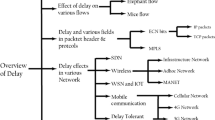Abstract
Universal mobile telecommunications system (UMTS) is a popular 3G system to support network applications full of variety. According to the quality of service (QoS) features of four types of UMTS traffic, this study proposes a BBQ (byte-based queuing) scheme to handle a UMTS packet forwarding process in differentiation. With the BBQ scheme, four types of UMTS traffic depend on their QoS features to receive differentiated packet forwarding performance within a UMTS core network. Several scenarios are simulated to realize the packet transmission performance of the BBQ scheme. Moreover, a packet transmission performance comparison between the IETF RIO scheme and the BBQ scheme is discussed in this study. The simulation results show that a differentiated packet forwarding behavior among UMTS traffic can be provided by the BBQ scheme with low cost operation/architecture; this demonstrate the effectiveness of the proposed queuing scheme.
Similar content being viewed by others
References
3G Tutorial, UMTS overview. http://www.umtsworld.com/technology/overview.htm.
3GPP TS 23.101, General Universal Mobile Telecommunications System (UMTS) architecture, Release 6, (January 2005).
3GPP TS 23.107, QoS Concept and Architecture, Release 9.0, (June 2010).
Blake, S., et al. (1998). An architecture for differentiated services. IETF RFC 2475.
Jacobson, V., et al. (1999). An expedited forwarding PHB. IETF RFC 2598.
Heinanen, J., et al. (1999). Assured forwarding PHB group. IETF RFC 2597.
Saad, E. M., EL-Ghandour, O. M., & Jehan, M. K. (2008). Evaluation of QoS in UMTS backbone network using differentiated services. In 25th national radio science conference (NRSC), Egypt.
Masmoudi, A., Zeghlache, D., & Tabbane, S. (2005). Resource and scheduling optimization in HSDPA based UMTS networks. In Proceedings of world wireless congress (WWC 2005), San Francisco, May 2005.
Lopes, N. V., Nicolau, M. J., & Santos, A. (2008). Efficiency of PRI and WRR diffServ scheduling mechanisms for real-time services on UMTS environment. In IEEE NTMS 2008 (pp. 1–5).
Li, X., Chen, W., Timm-Giel, A., Görg, C., Bigos, W., & Klug, A. (2009). Dimensioning of the IP-based UTRAN with multiple node Bs for elastic traffic using diffServ QoS. In Proceedings of the 2009 IEEE 70th vehicular technology conference VTC2009-fall, Anchorage, Alaska, USA.
Shreevastav, R., McGoldrick, C., & Huggard, M. (2010). Delivering Improved QoS and Cell Throughput in UMTS Based HSDPA Networks. In IEEE transaction.
Chimeh J. D., Hakkak M., Azmi P., Bakhsi H. (2010) A complementary algorithm for capacity enhancement of UMTS HSDPA. IEICE Electronics Express 7(2): 53–57
Kaaranen H., Ahtiainen A., Laitinen L., Naghian S., Niemi V. (2005) UMTS networks: architecture, mobility and services. (2nd ed.). Wiley, Hoboken, NJ
ETSI TS 123 002, Network Architecture, V7.1.0, (March 2006).
Fu C.-H. (2010) A study on differentiated service queuing scheme with an overflow buffer allocation within a UMTS core network. Wireless Personal Communications 55(3): 325–347
Aweya J., Ouellette M., Montuno Delfin Y. (2002) TCP rate control with dynamic buffer sharing. Computer Communications 25(10): 922–943
Aweya J., Ouellette M., Montuno Delfin Y. (2003) A multi-queue TCP window control scheme with dynamic buffer allocation. Journal of Systems Architecture Volume 49(7–9): 369–385
Tham C.-K., Yao Q., Yuming J. (2002) Achieving differentiated services through multi-class probabilistic priority scheduling. Computer Networks 40(4): 577–593
Floyd S., Jacobson V. (1995) Link sharing and resource management models for packet networks. IEEE/ACM Transactions on Networking 3(4): 365–386
Floyd S., Jacobson V. (1993) Random early detection gateways for congestion avoidance. IEEE/ACM Transactions on Networking 1(4): 397–413
Floyd, S. (1997). RED: discussions of setting parameters. Available at http://www.icir.org/floyd/REDparameters.txt, November 1997.
Chuck, S. (2001). Supporting differentiated service classes: Queue scheduling disciplines. Santa Clara, CA: Juniper Networks.
Orozco J., Ros D., Incera J., Cartas R. (2005) A simulation study of the adaptive RIO (A-RIO) queue management algorithm. Computer Communications 28(3): 300–312
Pieda, P., Ethridge, J., Baines, M., & Shallwani, F. (2000). A network simulator differentiated services implementation. Technical report, Available from: http://www.isi.edu/nsnam/ns, July 2000.
Author information
Authors and Affiliations
Corresponding author
Rights and permissions
About this article
Cite this article
Fu, C.H., Yen, Y.Y. A Study on a Differentiated Service Queuing Scheme Based on Transmitted Bytes Within a UMTS Core Network Gateway. Wireless Pers Commun 68, 1539–1563 (2013). https://doi.org/10.1007/s11277-012-0538-1
Published:
Issue Date:
DOI: https://doi.org/10.1007/s11277-012-0538-1




